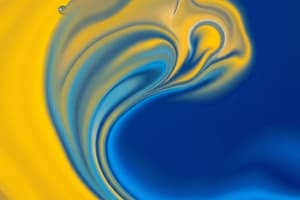Podcast
Questions and Answers
What is viscosity?
What is viscosity?
Viscosity refers to the internal resistance of a fluid to shear or flow.
Provide a real-world example of a highly viscous substance.
Provide a real-world example of a highly viscous substance.
Honey is more viscous than water due to its complex molecular structure.
How is viscosity mathematically described?
How is viscosity mathematically described?
[ \eta = \frac{\tau}{\dot{\gamma}} ]
What is pressure in relation to fluids?
What is pressure in relation to fluids?
Is the pressure in a fluid uniform throughout its volume?
Is the pressure in a fluid uniform throughout its volume?
What role does surface tension play in the behavior of fluids?
What role does surface tension play in the behavior of fluids?
Explain the concept of pressure and provide a real-world example where pressure is demonstrated.
Explain the concept of pressure and provide a real-world example where pressure is demonstrated.
How is pressure calculated, and what are the variables involved in the pressure formula?
How is pressure calculated, and what are the variables involved in the pressure formula?
Define surface tension and explain why it is an essential property of fluids.
Define surface tension and explain why it is an essential property of fluids.
Provide a real-world example that showcases the effect of surface tension.
Provide a real-world example that showcases the effect of surface tension.
What mathematical equation describes surface tension, and what are the variables involved in this equation?
What mathematical equation describes surface tension, and what are the variables involved in this equation?
How do the mechanical properties of fluids impact technological advancements? Provide an example.
How do the mechanical properties of fluids impact technological advancements? Provide an example.
Flashcards are hidden until you start studying
Study Notes
Mechanical Properties of Fluids: Viscosity, Pressure, and Surface Tension
Fluids, as a fundamental state of matter, exhibit unique properties that enable them to flow, interact, and transport energy. Among these properties, viscosity, pressure, and surface tension play crucial roles in shaping the behavior of fluids. To better understand these concepts, let's delve into each one.
Viscosity
Viscosity refers to the internal resistance of a fluid to shear or flow. It is a measure of the fluid's stickiness or thickness and how easily it deforms under stress. The higher the viscosity of a fluid, the more it resists deforming.
Real-world examples:
- Honey is more viscous than water due to its complex molecular structure, making it difficult to pour or pump.
- Motor oil has a higher viscosity than water to ensure better lubrication and protection of engine components.
Viscosity can be described mathematically by the relationship between the shear stress and the rate of shear strain:
[ \eta = \frac{\tau}{\dot{\gamma}} ]
where η (eta) is the dynamic viscosity, τ (tau) is the shear stress, and (\dot{\gamma}) (dot-gamma) is the rate of shear strain.
Pressure
Pressure is the force applied per unit area exerted by a fluid. In simple terms, it is the amount of pressure it takes to stop a fluid from expanding or sinking. The pressure in a fluid is uniform throughout its volume, as long as there are no external forces acting on it.
Real-world examples:
- The air pressure inside an inflated balloon is felt evenly throughout the balloon's volume, pushing against the balloon's skin equally in all directions.
- The force exerted by water on the walls of a swimming pool is due to the water's pressure.
Pressure can be calculated using the formula:
[ P = \frac{F}{A} ]
where P is the pressure, F is the force, and A is the area.
Surface Tension
Surface tension is the property of a fluid that makes it behave like an elastic membrane at its free surface. It is a driving force that causes a fluid to shrink into the smallest possible surface area. Surface tension is essential for phenomena like capillary action, where a fluid climbs up a narrow tube, and the tendency of a liquid to form a droplet.
Real-world examples:
- A water bug or water strider can walk on water due to the surface tension of water.
- The shape of a droplet of mercury on a glass surface is due to the high surface tension of mercury.
Surface tension can be mathematically described using the Laplace-Young equation:
[ \Delta P = \gamma \left(\frac{1}{R_1} + \frac{1}{R_2}\right) ]
where ΔP is the pressure difference across the interface, γ is the surface tension, and R1 and R2 are the radii of curvature of the interface.
By understanding the mechanical properties of fluids, we can appreciate the many applications of these properties in everyday life. From understanding the behavior of blood flow in the human body to designing more efficient engines, the study of fluids' mechanical properties is essential for advancing scientific knowledge and developing practical technologies.
Studying That Suits You
Use AI to generate personalized quizzes and flashcards to suit your learning preferences.



